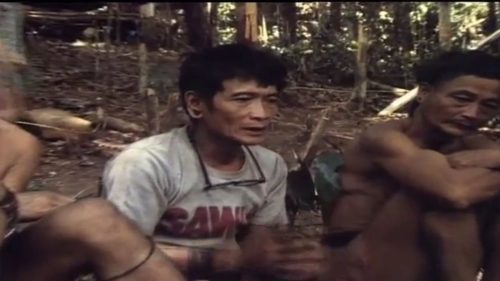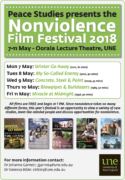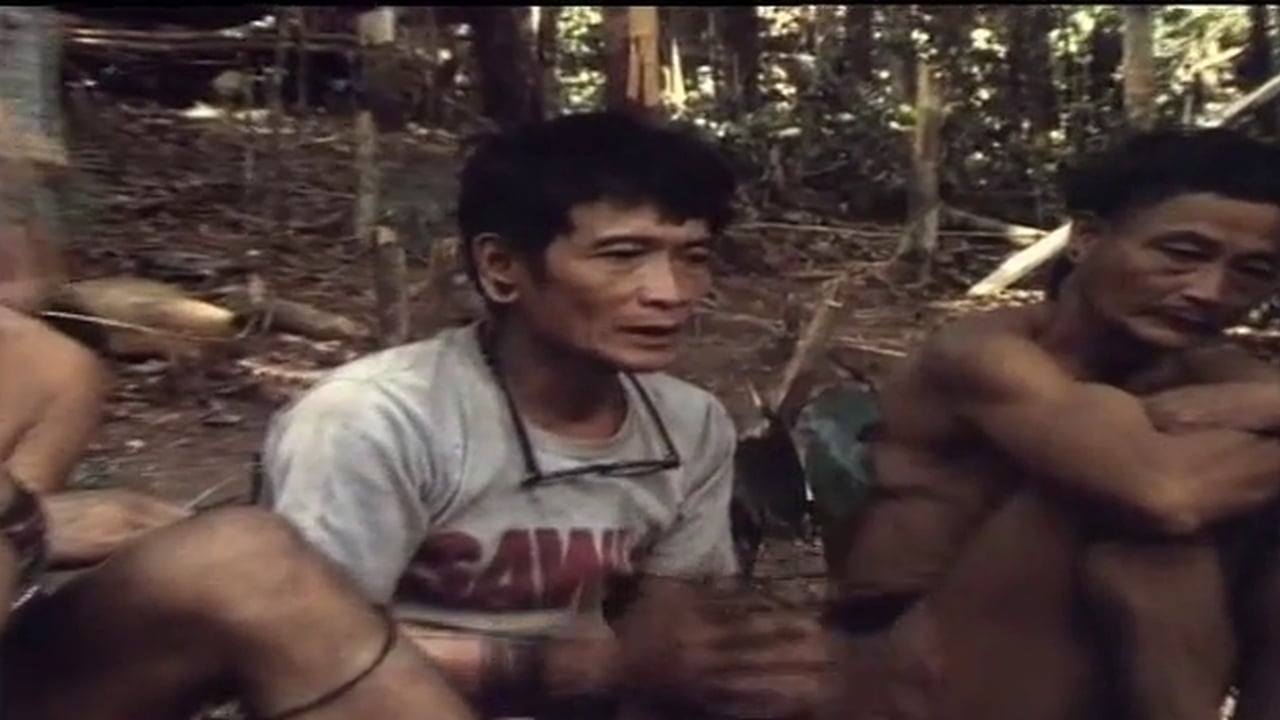 Peace Studies presents the Nonviolence Film Festival 2018 7-11 May – Oorala Lecture Theatre, UNE
Peace Studies presents the Nonviolence Film Festival 2018 7-11 May – Oorala Lecture Theatre, UNE
- Mon 7 May: Winter Go Away (2012, 82 mins)
- Tues 8 May: My So-Called Enemy (2010, 90 mins)
- Wed 9 May: Concrete, Steel & Paint (2009, 55 mins)
- Thurs 10 May: Blowpipes & Bulldozers (1989, 50 mins)
- Fri 11 May: Miracle at Midnight (1998, 90 mins)
 All films are FREE and begin at 1 PM. Since nonviolence takes on many different forms, this year’s festival is an opportunity to view a variety of case studies, meet like-minded people and discuss opportunities for nonviolence.
All films are FREE and begin at 1 PM. Since nonviolence takes on many different forms, this year’s festival is an opportunity to view a variety of case studies, meet like-minded people and discuss opportunities for nonviolence.
UNE’s Nonviolence Film Festival is an annual festival of documentaries about nonviolent campaigns around the world, presented by Peace Studies. This year’s festival shows that nonviolence takes on many different forms. It features five outstanding films based on, or relating to, nonviolent activism. The lunchtime films commence at 1pm and are all free and open to the public. The festival runs from Monday 7 May to Friday 11 May in UNE’s Oorala Centre.
The festival begins with WINTER GO AWAY (2012). This is the film which the famous Pussy Riot church scene is taken from. This unique documentary, shot by students under the direction of filmmaker Marina Razbezhkina, describes events in Russia during the 2012 presidential elections. In the winter months of 2011-2012, hundreds of thousands of Russians in dozens of cities across the country took to the streets to protest against rigged elections. People of different political views were united under the banner of “For Fair Elections”. The film bears witness to how the authoritarian president, Vladimir Putin, has divided Russian society. It records the hopes of his opponents calling for change as well as the dreams of many Russians who yearn for real freedom and democracy.
Tuesday’s film is MY SO-CALLED ENEMY (2010) which follows six courageous Palestinian and Israeli teenage girls who participated in a cross-cultural women’s leadership program in the U.S. It documents how, over the next seven years, the transformative experience of knowing their “enemies” as human beings meets with the realities of their lives back home in the Middle East. A film about not making assumptions, or creating an “other”, My So-Called Enemy presents the complexities of the Israeli/Palestinian conflict through a human lens, and the possibility and hope that come from listening to each other’s stories.
Next is CONCRETE, STEEL & PAINT (2009) which chronicles the discussions, dialogue, conflict and art of men and women – victims and offenders alike – involved in the Mural Arts Restorative Justice Program at the Pennsylvania State Correctional Institution at Graterford. Putting victims and offenders together would seemingly spark conflict, but the opportunity also recognizes the desires of the offender to be restored to the community.
On Thursday we present BLOWPIPES AND BULLDOZERS (1989), the moving story of the Penan, a unique tribe of rainforest nomads living in Sarawak, Borneo, part of Malaysia. After 40,000 years of living at one with the jungle, the tribe is being logged out of existence.
A Swiss man, Bruno Manser, spent five years living with the Penan people, completely adapting his lifestyle to theirs. He helped to organise their resistance and publicise their plight. The film was made by a clandestine Australian crew in the hope of getting the story of the Penan and Bruno Manser (wanted by the Malaysian Government and now presumed dead) known to the outside world before it is too late. This is a film that will stir your heart.
The festival concludes with MIRACLE AT MIDNIGHT (1998), a story of nonviolent resistance in which the Danes openly defied the Nazi occupation and saved over 7,000 Jews by transporting them to neutral Sweden. Other acts of sabotage against the Nazi war machine, as well as a massive general strike, stymied the occupiers and rendered their presence in the country untenable.
